Alumni Profile: Mor Cohen-Tal, Master in Computer Science ’14
Categories

Mor Cohen-Tal, Master in Computer Science ’14, speaks about how her degree has helped her to become the Cloud CTO of Turbonomic.
Categories

Mor Cohen-Tal, Master in Computer Science ’14, speaks about how her degree has helped her to become the Cloud CTO of Turbonomic.

Amanda Emmanuel, Johnson Cornell Tech MBA ’15, speaks about how her degree has helped her to become the Lead Product Manager of Attentive.
A new Android app developed by Cornell Tech researchers and collaborators will make it easy for people to collect their personal health data and share it with trusted medical providers or apps.
CommonHealth is an open source, nonprofit public service, designed in partnership by Cornell Tech; the University of California, San Francisco (UCSF); Sage Bionetworks; Open mHealth; and The Commons Project.
The app is being piloted at UCSF and select medical centers and health care systems.
CommonHealth was designed as an alternative to Apple Health, a popular health care app currently in use by hundreds of hospitals but not available to people without Apple devices. Both tools will allow users who are patients at participating medical centers to download their health records to their phones and share their records with other partners.
“Apple has shown real leadership and moved the industry forward by enabling patient access to their health information,” said JP Pollak, CommonHealth’s product lead and senior researcher in residence at Cornell Tech.
“Now CommonHealth is significantly expanding the number of people who can benefit from easy electronic access to their health records,” said Pollak, also a visiting fellow in medicine at Weill Cornell Medicine and an assistant professor in the Clinical Epidemiology and Health Services Research Program at the Weill Cornell Graduate School of Medical Sciences.
For example, a patient using CommonHealth who is seeking a second opinion on a diagnosis could easily provide medical records to a participating doctor, rather than waiting to receive printed images or CDs and hand-delivering them.
To ensure patient privacy and promote trust, the CommonHealth partners are building a robust governance model to review and approve all apps and partners connecting to CommonHealth.
The personal health data collected in aggregate through CommonHealth may also be used to improve digital therapeutics and diagnostics, biomedical research and patient care, the researchers said.
“The upcoming launch of CommonHealth will unlock a wealth of opportunities for the developer and researcher communities, helping them to conduct more inclusive studies and deliver personal health management tools,” said Deborah Estrin, the Robert V. Tishman ’37 Professor and associate dean for impact at Cornell Tech and co-founder of Open mHealth, a nonprofit aiming to make patient-generated health data open and accessible.
Categories
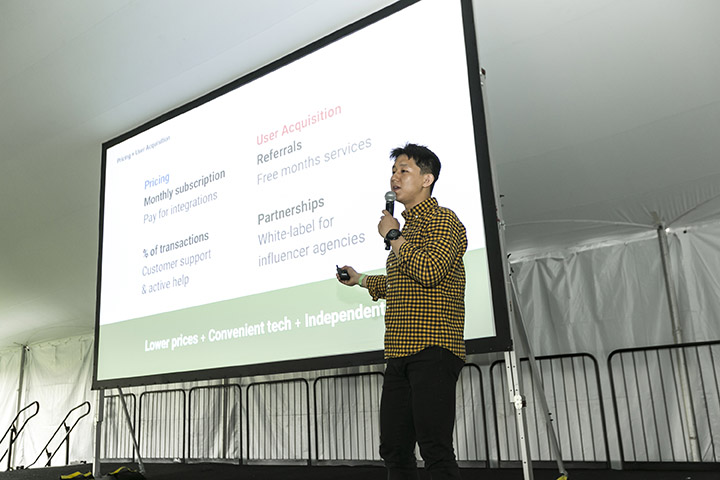
You might not think watching videos on YouTube would be the key to creating a Startup Award-winning project.
But it worked for Rongxin Zhang, Technion-Cornell Dual Master’s Degree in Connective Media ‘19, who worked as a software engineer at the real estate/tech company Zillow for several years prior to attending Cornell Tech. Rongxin was among the founders of a data startup that was acquired by Zillow in 2014.
While spending hours on YouTube is, he acknowledged, “probably a bad thing,” that habit led to a great idea when he started to notice how many YouTube content creators monetized their content through side businesses, rather than directly through YouTube ads or sponsorships.
That realization inspired Zhang to found Corcus.io, which helps the next generation of content creators grow and run their entire business through a suite of digital tools and services. One of Corcus’ products which solves this is a unified management dashboard.
“A big problem for creators right now is that they have to use maybe a dozen different dashboards,” said Zhang.
Creators need a homepage to establish a web presence, a media kit to work with sponsors, a Shopify page to display and sell merchandise, a MailChimp account for creators to email followers and subscribers, a ticketing platform to promote live events, a PayPal account, etc.
The problem is that most creators are run by one or two-person teams. By creating a central dashboard from which every aspect of their business can be managed, Corcus aims to ease the lives of new creators by allowing them to automate key aspects of their businesses.
Among other companies and creators, Zhang has been working with a successful YouTube fitness content creator with over 600,000 YouTube subscribers. Thanks to Corcus, she can now automate many of the mundane business tasks and focus on creating great content for her audience. One of the core benefits of using Corcus is that it “knows” how past campaigns have worked from tracking a business’s analytics. As a result, it can help creators build compelling digital media kits and “rate-cards” that make it easier for them to attract and work with sponsors.
“It’s really powerful when all of these things come together in a single platform,” said Zhang, as a single connected system creates “some sort of intelligence” for “automatically managing” and growing entire product or sales campaigns.
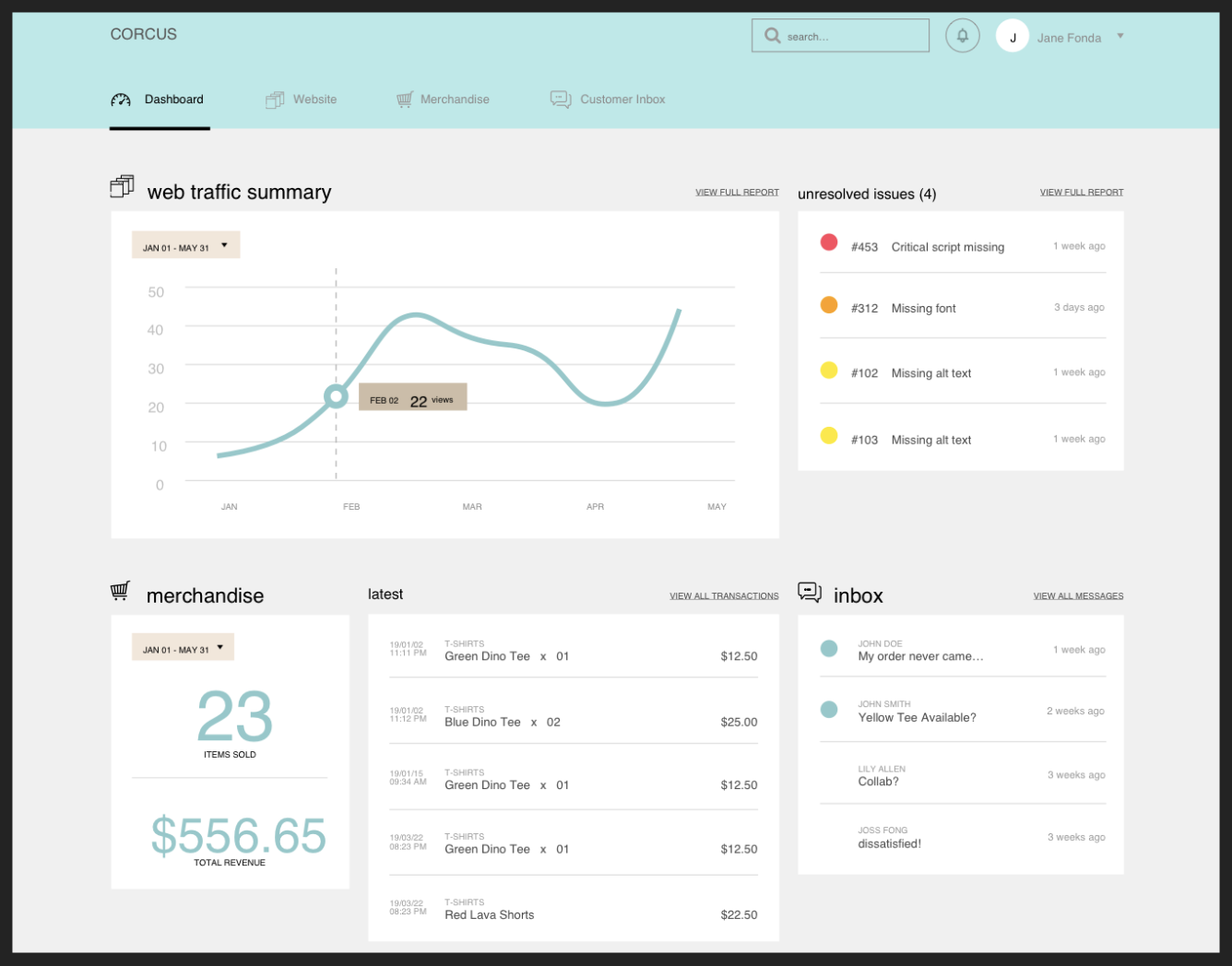
In winning one of four Cornell Tech Startup Awards, Corcus received a number of tangible benefits, including $80,000 in pre-seed funding and $20,000 worth of co-working space in the Tata Innovation Center on the Cornell Tech campus.
But for Zhang, the most valuable part of the award was the community of founders and mentors he now has access to and the validation for the market. Describing it as a crucial “runway” between finishing school and launching Corcus, he said the award has been essential in helping to hire talented people, build a better product and feel more confident in his creation.
Zhang also appreciates Cornell Tech’s emphasis on social responsibility, and praised the school for encouraging students to invest in projects “which can be a source of light in the dark.”
He said he approached his project by asking himself, “In 3 years time, will I be proud of what I built, the impact it had on the people that I served and was the reward big? If the answer to these questions is yes, then I pursue it,” Zhang said.
Another valuable legacy of Zhang’s time at Cornell Tech is increased resilience. Having had to learn how to solve complex problems and having worked with talented and hardworking classmates, he now has a better understanding of “how to deal with that doubt” that all entrepreneurs face. “If things aren’t working out or you don’t know how to solve a problem, you can look back and say, ‘Okay, I’ve had similar experiences and I know where to look for the answer, and this is how I overcame it.’”


Categories
Cornell Tech alumni startup Airbud recently raised a $4 million seed round for their plug-and-play system that allows enterprises to easily add voice capabilities to their websites and mobile apps.
Airbud was founded in Startup Studio by Israel Kush, Johnson Cornell Tech MBA ‘18, and Rom Cohen, Master of Computer Science ‘18.
According to the announcement in TechCrunch, “Airbud is focusing on websites that you have to be on, rather than the ones you want to be on” with the majority of their clients working in the healthcare and travel spaces.
Read the full story in TechCrunch.
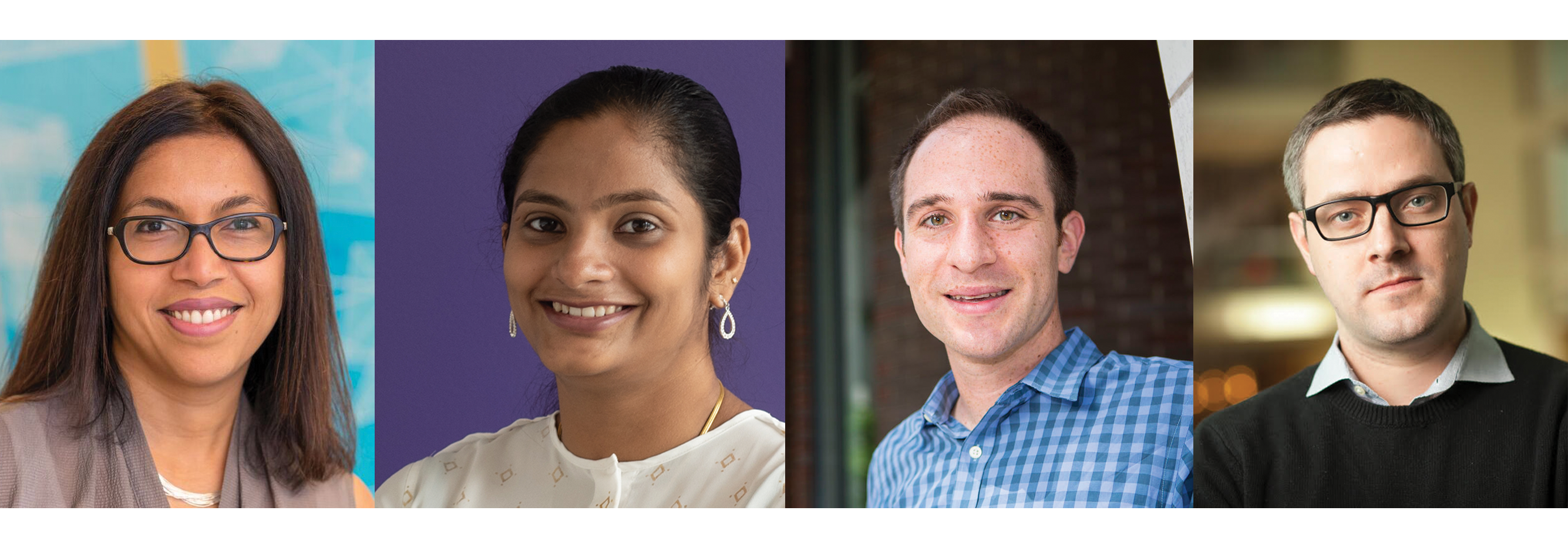
Cornell Tech and Jacobs Technion-Cornell Institute welcome new faculty with expertise across disciplines including machine learning, computational photography, and mobile health applications
NEW YORK, NY – Cornell Tech today announced four new professors who will join the campus’ distinguished faculty. With research and industry experience in fields such as machine learning, computational photography, and mobile health applications, these professors will build on Cornell Tech’s interdisciplinary and groundbreaking research. Today, Cornell Tech is home to more than 30 world-class faculty members advising nearly 70 PhD students.
“With a breadth of expertise, our new faculty members will enrich Cornell Tech’s campus by driving groundbreaking research, mentoring students, and working with New York-based startups, companies, and nonprofits,” said Greg Morrisett, Jack and Rilla Neafsey Dean and Vice Provost of Cornell Tech. “Along with the rest of the Cornell Tech faculty, our new professors are at the forefront of solving some of the most complex and crucial problems of the digital age which is why we’re thrilled to welcome them to our multidisciplinary community on campus.”
The new professors include:
Guided by both academic excellence and practical impact, Cornell Tech’s purpose-driven research program spurs relevant and valuable progress in five areas: Human-Computer Interaction (HCI) and Social Computing, Security & Privacy, Artificial Intelligence & Robotics, Data & Modeling, and Law & Policy. Cornell Tech’s faculty is publishing groundbreaking research — for instance, Nicola Dell created technologies countering domestic abuse through mobile apps; Ari Juels analyzed manipulation on cryptocurrency exchanges; and Nathan Kallus studied how algorithms determining credit and loan decisions produce racist consequences.
About Cornell Tech
Cornell Tech brings together faculty, business leaders, tech entrepreneurs and students in a catalytic environment to produce visionary results grounded in significant needs that will reinvent the way we live in the digital age. The Jacobs Technion-Cornell Institute embodies the academic partnership between the Technion-Israel Institute of Technology and Cornell University on the Cornell Tech campus.
Cornell Tech’s Roosevelt Island campus opened fall 2017. When fully completed, the campus will include two million square feet of state-of-the-art buildings, over two acres of open space, and will be home to more than 2,000 graduate students and hundreds of faculty and staff.

Categories
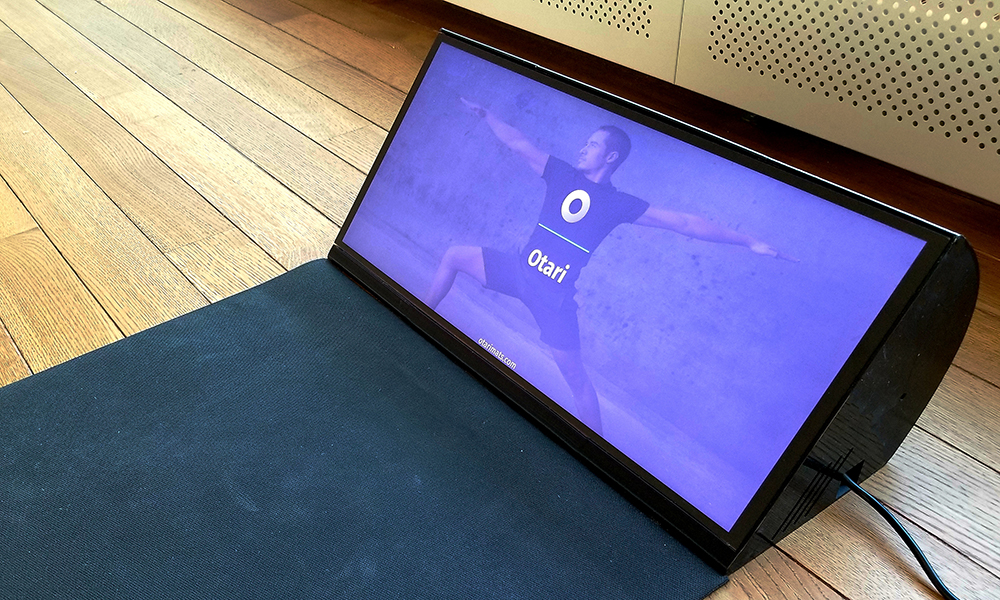
Finding time to stay in shape can be a struggle for busy people. The obvious choices—going to a studio class or following along to YouTube videos at home—have flaws. Classes can be expensive and quality varies. Following a prerecorded yoga session or a high-intensity workout online is a quick and handy option but you won’t get individual feedback on your poses, planks, and squat jumps.
It is a problem that struck a chord with former athletes and Cornell Tech graduates, Chris Kruger, Skyler Erickson, Campbell Weaver, candidates for Master in Computer Science ’19, and Chris Brownell, Johnson Cornell Tech MBA ’19.
The team’s solution, Otari, is a smart exercise mat that uses computer-vision algorithms to recognize how your body is moving in three-dimensional space. It then gives real-time feedback and improvement tips. Designed with city dwellers and space-saving in mind, the mat can be stored in a closet and easily taken out for use. Otari is one of four recipients of a 2019 Cornell Tech Startup Award.
Exclusive content and personalized feedback
Otari’s exercise mat comes with an attached HD display and embedded smart camera. Exercises are displayed on a screen and the system uses computer vision to recognize your body position. It then compares this data to key reference points for the exercises you are doing, calculates any differences, and provides real-time feedback.
The team is currently focusing on yoga, Pilates, and interval training, and is working with fitness instructors to develop exclusive content that will be available to download via a subscription service. Audio feedback will be given in the instructor’s voice, as opposed to a robotic one, and on-screen graphics will show you where your body should be.
Otari will also respond to your progress and classes will change over time, said Kruger, while a live-streaming option will introduce a competitive edge. “You will have the option to go deep on the feedback on your own or go down the competitive gamification route and feel like you’re in a class with your friends,” he said.
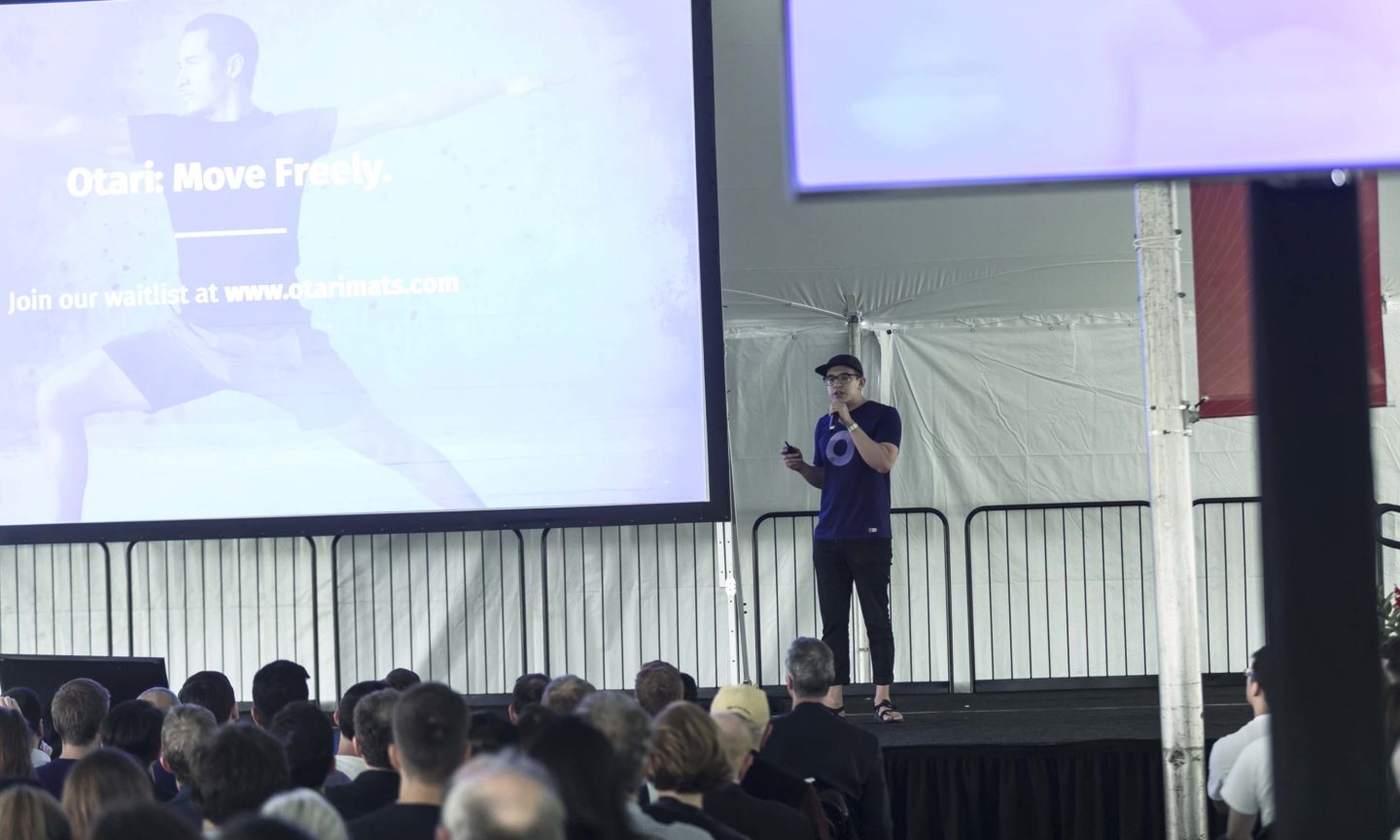
Next steps for the smart mat
Otari is currently a prototype that includes the hardware and software infrastructure for squat jumps and push-ups. Kruger cites on-campus experts, such as MakerLAB’s Creative Lead Niti Parikh, as being pivotal in getting the prototype to this stage. Parikh is a designer/maker with more than 10 years of experience in the fields of interior architecture and sustainable manufacturing; her insight has been invaluable, said Kruger.
The Cornell Tech Startup award, which includes $80,000 in pre-seed funding and $20,000 of co-working space in the Tata Innovation Center, will now support the smart mat’s trajectory to market. The money will be split between Otari’s software and hardware elements.
In terms of software, the content catalog will be expanded to include complete routines and classes. To develop Otari’s hardware, the team will work with a professional industrial designer and identify sustainable production materials. They will also take the product to potential users for feedback. There is a clear timeline for next steps, “On the software front, we’re looking to have a totally working, beginning-to-end system by the end of summer. We’re hoping to have the hardware piece done and ready to hit the market by the end of 2019 or Q1 2020,” Kruger said.
And what about that unusual brand name? Otari is taken from Otariinae, the scientific name for sea lions, creatures known for their flexibility and curiosity. “We thought it was what we were working towards — curious people improving their flexibility on our mat,” said Kruger.
Categories
Categories